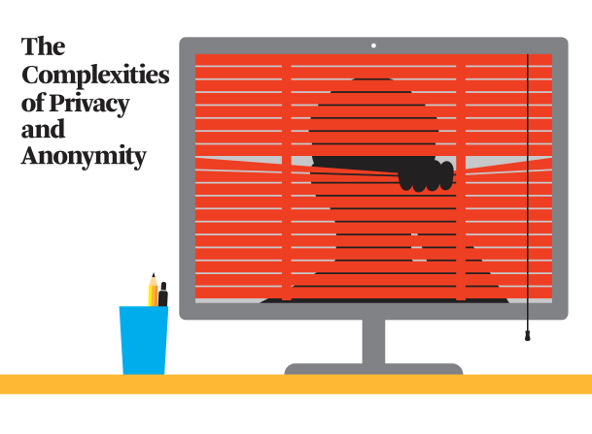COLUMN: Letter from the editors
FREE CONTENT FEATURE
Equip Yourself for Creativity
By Peter Kinnaird, Inbal Talgam-Cohen

When real and digital worlds collide things can get messy. Complicated problems surrounding privacy and anonymity arise as our interconnected world evolves technically, culturally, and politically. But what do we mean by privacy? By anonymity? Inside this issue we have contributions from lawyers, researchers, computer scientists, policy makers, and industry heavyweights all of whom try to answer the tough questions surrounding privacy, anonymity, and security. From cryptocurrencies to differential privacy, we look at how technology is used to protect our digital selves, and how that same technology can expose our vulnerabilities causing lasting, real-world effects.
By Peter Kinnaird, Inbal Talgam-Cohen
By Michael Zuba
Should there be a standard in the way of algorithms languages to improve productivity and remove ambiguity?
By Olivia Simpson
Accepting the habitual system as an inseparable part of our minds, understanding its limitation and the way it works, may help us to achieve our long-term goals.
By Gidi Nave
There is something to be gained by borrowing the tools of differential privacy and applying them to solve problems in seemingly unrelated fields.
By Aaron Roth
Stanford grad student Jonathan Mayer discusses cookies, Web tracking, and changes to Mozilla's cookie policy.
By Jonathan Mayer
Revealing private content on the Web can also spark public engagement. To understand this, we need to challenge our common sense notions of privacy and democracy.
By Andreas Birkbak
The line between personal and anonymous information is often unclear. Increasingly it falls to lawyers to understand and manage the risks associated with the sharing of "anonymized" data sets.
By Marion Oswald
Why defining what counts as personal data is important for data protection and information sharing.
By Iain Bourne
People think they want anonymity, but actually desire privacy. But how do we reframe the debate surrounding privacy and security? Perhaps technology is the answer.
By David Birch
Protecting data privacy and anonymity requires a better understanding of the conditions and mechanisms under which they may be threatened.
By Elaine Mackey, Mark Elliot
Strengths and weaknesses of the leader in a new generation of emerging cryptocurrencies.
By Dominic Hobson
A decade since the first version was released, Tor continues to be at the center of the debate around online privacy.
By Kelley Misata
New information hiding techniques use online games to transmit secrets covertly. The technique is simple, but the problem of detecting these covert channels is far from solved.
By Philip C. Ritchey
The vast amounts of data that are now available provide new opportunities to social science researchers, but also raise huge privacy concerns for data subjects. Differential privacy offers a way to balance the needs of both parties. But how?
By Christine Task
Distinguished Scientist at Microsoft Research, Dr. Cynthia Dwork, provides a first-hand look at the basics of differential privacy.
By Michael Zuba
In this profile, Jessica Staddon discusses managing privacy research for one the world's best-known technology corporations.
By Adrian Scoică
CUPS, a research lab at Carnegie Mellon University, is dedicated to addressing the broad array of challenges collectively called "usable privacy and security."
By Rich Shay
A look back at wireless technology through the years.
By Finn Kuusisto